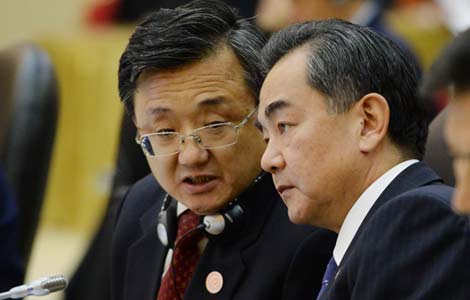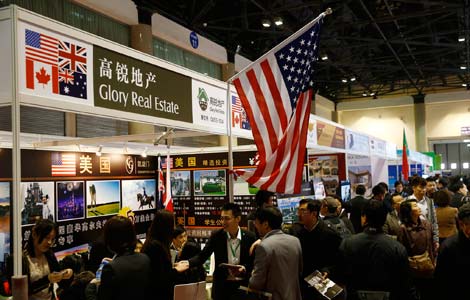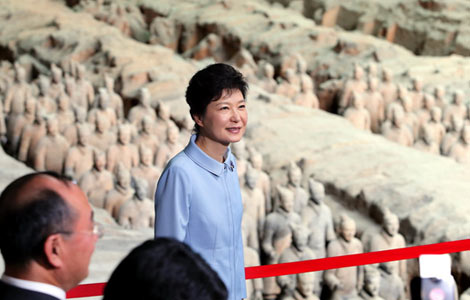Building on the bottom line
Updated: 2013-07-01 08:45
By Li Jingtian (China Daily)
|
||||||||
Third, the China-US relationship is affected by many persistent and complex structural factors, and it is undeniable that there are many differences, friction, conflicts and problems. Moreover, some people are still accustomed to viewing the China-US relationship with the mindset that a powerful country is bound to seek hegemony and the mentality of zero-sum competition. They believe that China's rise will affect the economy and security of the United States in all respects, and see China as a regional military rival, global economic competitor and comprehensive political opponent of the United States. All these are negative factors for developing a new type of relationship.
So how to accumulate the positive energy for development of a new type of relationship? I believe this can be done in two ways.
First, we can replace traditional values with innovative thinking. In the course of the development of human society, there have been conflicts, confrontations and even wars between major powers, especially between emerging powers and conservative ones, and a zero-sum game is the main characteristic of relations between major countries. Objectively, the rise of emerging powers is likely to cause conflicts with the existing powers, but this is not inevitable.
By building a new type of relationship between major powers, China and the United States can break the historical trend and explore a new road of relations among major countries. As President Xi said, "The vast Pacific Ocean has ample space for China and the United States".
To this end, China and the United States need to build mutual strategic trust and sound interaction, and avoid viewing each other as a potential and even a real "strategic rival", and avoid judging each other's strength and development trend from a contradictive, resistant or even hostile position and avoid taking precautions and containment against the other. China always insists on dialogue instead of confrontation, cooperation instead of conflict, being partners instead of adversaries, and pursuing mutual benefit instead of a zero-sum game.
Second, we should effectively control our differences to maintain the overall development of the China-US relationship. China and the United States have more common interests than differences, and we need to dilute and reduce differences. The two countries need to control the existing frictions and differences, keep them at a certain level and properly address and manage them through close communication and good interaction to ensure a proper understanding of each other's true intentions.
The two countries should respect and care for each other's major interests and concerns and strengthen the bottom line mindset. That is, we need to understand and respect each other's bottom line and not challenge or break through the bottom line of the other side. China never put its own interests above the interests of other countries, and it will never adopt a selfish beggar-thy-neighbor policy. But when it comes to safeguarding its national sovereignty, security and development interests, China has its own principles and bottom line. While being reasonable and considering the overall situation, China will never yield to any pressure from outside. No one should underestimate China's determination and ability to safeguard its national interests or expect China to swallow the bitter pill that harms its own interests.
The author is executive vice-president of the Party School. This article is based on his keynote speech at the 2013 China-US Academic Forum in Washington this month.

 NYC's gay pride march for celebration
NYC's gay pride march for celebration
 Foreign minister makes ASEAN debut as tensions flare
Foreign minister makes ASEAN debut as tensions flare
 Yao stresses transparency in charity
Yao stresses transparency in charity
 Massive debt plagues local gov't
Massive debt plagues local gov't
 Looking abroad for better investment
Looking abroad for better investment
 New high-speed rail starts operation
New high-speed rail starts operation
 Kerry extends Mideast peace mission
Kerry extends Mideast peace mission
 ROK president visits Terracotta Warriors
ROK president visits Terracotta Warriors
Most Viewed
Editor's Picks

|

|

|

|

|

|
Today's Top News
New NSA spying allegations rile EU
Fugitive terror suspect nabbed
Minister makes ASEAN debut
Ministry drafts child welfare system
New exit and entry law effective
'Overseas talent drive requires more guidance'
19 detained for spreading rumors in Xinjiang
Yao stresses transparency in charity
US Weekly

|

|






